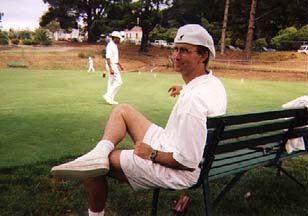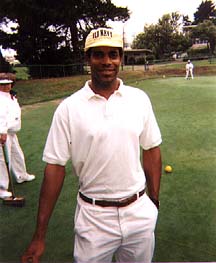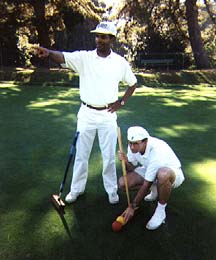

|
Back to |
| The Front Page |
| People |
"WEB BABIES" CHANGING
THE DEMOGRAPHICS OF CROQUET
by Bob Alman
They discovered the sport of 6-wicket croquet on the World Wide Web, and they seem to share a lot of other characteristics as well. We started calling them "Web Babies," and the name stuck.
Multiply this story by 1000 clubs and you've got the next generation of star players and the beginnings of a new global croquet boom.
 Marc Batten works overtime as an Electrical Engineer Manager and still packs in two days of practice a week. |
It was the Information Superhighway that brought to us the club's New Great Hope for the 90's. Early this year, and entirely unknown to each other, Reuben Edwards and Marc Batten were surprised to browse into a wealth of detailed information on a sport they hardly knew existed, and they were intrigued. Before they ever called the club number listed on the USCA Web site (which debuted in late January), they had already studied a universe of croquet rules, they had boggled their minds on instructionals materials on the Oxford University Web site, and they had even read profiles of croquet stars in CROQUET WORLD ONLINE MAGAZINE.
REFUSING TO PLAY, THEY PRACTICED THEIR SHOTS INSTEAD
Marc did the Introductory course in April, but Reuben didn't pick up a mallet until May. For novices, they were both exceptionally well-grounded in information and understanding. But here's what really distinguished these two: they watched more than they played. And when they started playing, they insisted on more shot practice than game-playing.
What kind of people would have the interest and patience to sit by the court all day long, watching top-level croquet, without even having played the game? Web babies, that's who. They had read about it onscreen, and now they needed to organize and assimilate all that knowledge. They had to figure it out by watching top-level play. It's not a prescription I would recommend to anybody, but for them, it worked.
Without ever seeing the play of Neil Spooner, Reuben has adopted a similar style - upright body position, Irish grip, quick backswing with a big follow-through. Hitting 80-foot roquets center-ball is becoming more frequent and he's no stranger to a 10-wicket break.
But Reuben, an African American, has confessed to initial misgivings about croquet. "The images on the net were of social clubs that also played croquet. So I had to think, Do I want to join a social club?" He'd seen the demographics on the Internet. "All those millionaires," he explained, "and I had seen pictures of the places where croquet is played - country clubs, resorts, the kinds of places that haven't always had that open-door, glad-to-see-you policy ..." He put aside his misgivings the moment he came to the court for the first time. "I discovered that the S. F. Club was an active sport club. We are here to play croquet. Period."
 Reuben Edwards, who writes computer programs and screenplays, researched croquet for a scene in a romantic comedy. |
Coming from the player most likely to be American croquet's answer to Tiger Woods (the California rookie who is the new sensation of the golfing world), Reuben's doubts about making contact with the local croquet culture raise questions about the image croquet presents to the cyber-world.
Why this more "social" than "sport" impression? While Reuben found tournaments listed on the web, "There were not many results! The outcomes seemed less important than the social gatherings. What other sport takes that approach? Since joining, I've met interesting players and seen lots of great croquet. It's too bad so many Web sites treat it all like a prelude to luncheon - although Meadowood serves a great lunch. If croquet sites don't take the sport seriously, who will? At least it's starting to change. Brain Storey and others did a great job covering the MacRobertson international team matches in England this year. That should be the model."
QUESTIONING THE PUBLIC IMAGE
An essay in CROQUET WORLD moved Reuben to make the initial call to the club. "I read the article on 'Whites,' about the dress code, and I thought, At least they're AWARE of this image of exclusivity, of 'clubbiness'. If they're aware of it, there must be people who question it. When I tell people I play croquet, they sort of make a face, like, 'Oh no, not that! Not those people...' And I say quickly, 'It's not that way, really! Its fun and frustrating like any other sport. And the people in the club are like San Francisco, as diverse and cosmopolitan as the City.' My friends don't really get it, though."
IT'S LIKE KNOWING THE PASSWORD AT THE SPEAKEASY
The monolithically stodgy public image of croquet evaporated for Reuben in the welcome croquet players everywhere give to people who show genuine interest in the sport. He watched club tournaments and hung out for days at the San Francisco Open, all before starting serious practice. "I've seen the San Francisco Open, the World Singles Championship at Sonoma-Cutrer, and the Meadowood Classic. From the first day," he recalls, "all the players, even the best in the world, have been great. They took time to explain things and answer questions. Gaining entre among the players is like knowing the secret handshake, or the password at the speakeasy. I have never felt unwelcome, anywhere."
Reuben writes screenplays and initially found croquet while researching a script. A backyard 9-wicket game initially kindled his interest. "There was tension, there was aggression, hostility, humor, and I thought this would be great for a romantic comedy; a good thing for people who might be starting a relationship to do to get them established as a couple." While waiting for Hollywood to call back, Reuben free-lances as a computer programer.
TIME FOR PRACTICE, TIME FOR PLAY, TIME FOR FAMILY
Marc Batten is hard-pressed to keep up with Reuben's on-court application of the technical refinements of the sport. He's an Electrical Engineering Manager with three computers, a wife, a teenage daughter, and too little time to practice. At this stage, he still maintains a 50/50 practice-to-play ratio.
He first discovered the technical side of croquet from the Oxford University Web site. The analysis of peeling and the dynamics of break play he found there appealed to his engineering sensibilities. "My initial impressions were that croquet seemed to be a thinking, intricately tactical game. I kept going back to the site, getting more and more into the whole theory of the game." With a little prodding from the flesh-and-blood San Francisco championship-level player Carl Hanson, Marc headed out to the courts. "He made it seem just weird enough to be something I should try."
Marc has adopted the elegant, but difficult to master, Solomon grip, following in the tradition of fellow club members Hanson and Wayne Rodoni, U.S. national champion. With a strong, straight stroke, Marc took quickly to golf croquet and just as quickly became a force to be reckoned with. In only the second month of membership, he won the first golf croquet tournament he entered, winning every game in his flight. He gave his opponents no quarter, and he relished his first experience of victory. "I love golf croquet! It's like the food there to sustain you after a day of practicing shots. You can just relax and play a game of golf croquet."
Croquet is Marc's escape from his entire family's addiction to golf, for which he has never cared. "But I see parallels in my growing addiction to croquet," he acknowledges. "There's always something more to go for, a new strategy, a new tactic. You can pick it up fairly quickly and reach some level of satisfaction early, but there's always more." As for other sports, "Baseball, basketball, and football annoy me because of the gratuitous commercialization and pack instinct appeal. I've always liked 'odder' or lesser known sports - cycling, freestyle frisbee, cross country, martial arts. So croquet is a natural extension for me."
 The Web drew into the sport two of the hottest rookies in California, training partners on a fast track to excellence. |
Marc and Reuben are, in effect, training partners, pacing each other in their advancing understanding of tactics and strategy and mastery of shot-making skills. Their partnership is rooted in friendly rivalry. They're learning just as much from each other on the court as from observing the advanced players from courtside. They've successfully made the transition from cyber-croquet to the real thing. Marc and Reuben are the vanguard of a new generation of players and champions.
Croquet has long enjoyed notoreity as a social calisthenic. Now, the World Wide Web constitutes an inexpensive and rapidly developing public medium for publicizing the croquet formerly known to only a few of us - replacing outmoded, skewed public images with sharply-focused, contemporary electronic pictures of the real thing, the real sport, played by real people. The Web can show the world the still-evolving culture of croquet in its true dimensions as a serious and absorbing sport, backed up with a growing encyclopaedic store of online information.
For the vast majority not yet wired into 6-wicket croquet, the dominant public image of the sport will persist - of people in white, sequestered behind walls, fences, and hedges, knocking balls around manicured lawns with an inscrutable intensity of purpose, pausing often to sip champagne, nibble cucumber sandwiches, and engage in social chatter. If the image cannot be changed overnight via the Web, croquet organizers should not be too proud to trade on the positive elements of this public myth. And what's so wrong, anyway, with champagne and cucumber sandwiches, as a healthy alternative to hot dogs and beer?
In five years, the children of the Baby Boomers will be the prime market for croquet's continued growth - the 20-somethings who missed out on the sexual revolution, who are denied the economic opportunities their parents had, the first generation of Americans to grow into a world of diminished expectations, advertising their independence of thought by piercing their bodies and decorating them with rings of gold and silver. It's hard to imagine that they will ever be old enough for croquet.
But as a young and hip editor of a Web directory remarked to me not long ago, "You've got that nostaliga thing going, about croquet in the back yard, and that's good. For Generation X, croquet may be just square enough to be cool!"
POSTSCRIPT FROM THE EDITOR:
Almost every public Introductory Course for croquet conducted by the San Francisco Croquet Club includes people who "discovered" croquet and/or the SFCC on the Web. Surely this phenomenon is not limited to one locale. Let us know what effect the Web is having, if any, on your local croquet culture. E-Mail to: bobalman@aol.com